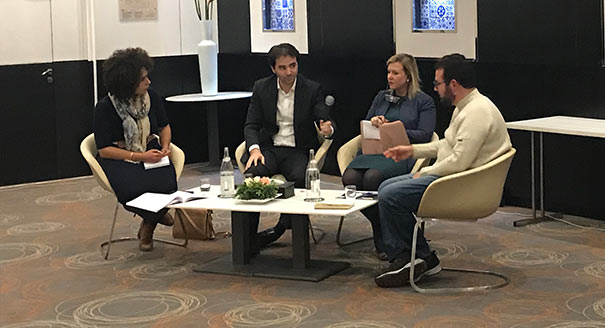Corruption in Tunisia is perceived to be even more pervasive today than under former president Zine el Abidine ben Ali, despite numerous legal measures and civil society initiatives working to fight it. In their paper, “Tunisia’s Corruption Contagion: A Transition at Risk,” Carnegie Fellow Sarah Yerkes and Vice President for Studies Marwan Muasher argue that corruption has become endemic, as more and more people engage in and benefit from corrupt practices. For the democratic transition to survive, Tunisia must simultaneously address the kleptocracy of the previous regime and the emergence of widespread petty corruption. Can Tunisia’s government and civil society win this fight?
The Carnegie Endowment for International Peace hosted a launch of this new paper in Tunis, with an audience of civil society activists, journalists, politicians, and academics. In a discussion moderated by Youssef Cherif of Columbia University Global Centers, Carnegie’s Sarah Yerkes discussed the paper’s findings. She was joined by Chaima Bouhlel, former president of Al Bawsala, and Cherif El Khadi of iWatch.
Discussion Highlights
- Fighting Corruption: Yerkes presented the main findings and recommendations of the paper, highlighting the important role played by Tunisian civil society in fighting corruption. This, she said, is in spite of the country’s active backsliding toward authoritarianism and attempts by some to push back against Tunisia’s democratic transition. Bouhlel examined some effective ways to fight corruption through decentralization and the reform of the educational system.
- The Importance of Justice: In the absence of justice, authoritarianism grows and corruption spreads everywhere, El Khadi warned. This can make it harder to fight corruption than terrorism, El Khadi added.
- Political Will: The speakers agreed that political will is crucial to the success of the Tunisian government’s war on corruption.Legislation against corruption, such as the protection of whistleblowers, will only make a difference if combined with strong political will, they said.
- Civil Society: Bouhlel and El Khadi discussed the difficulties faced by civil society in working effectively as a watchdog on government officials, including a lack of means to carry out their work and attacks leveled against civil society organizations and attempts at silencing them.
This event was simultaneously translated in Arabic and English.
Chaima Bouhlel
Chaima Bouhlel is a program director at Barr Al Aman and the former president of Al Bawsala.
Chérif El Kadhi
Chérif El Kadhi is the communications manager at I Watch.
Sarah Yerkes
Sarah Yerkes is a fellow in Carnegie’s Middle East Program.
Youssef Cherif
Youssef Cherif is the deputy director of the Columbia Global Center in Tunis.
